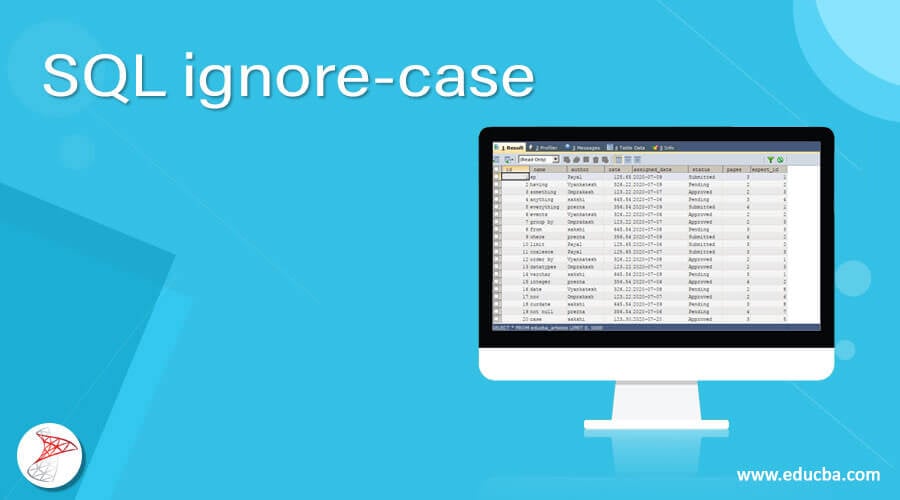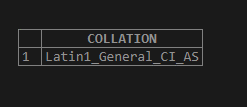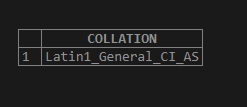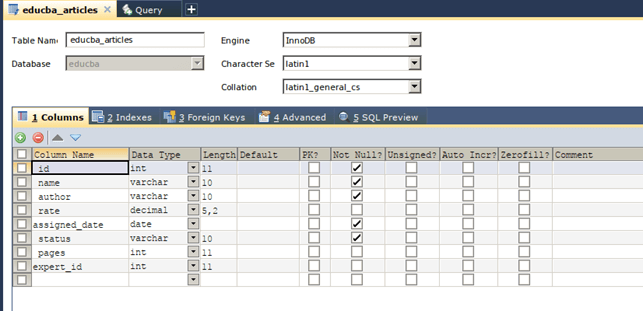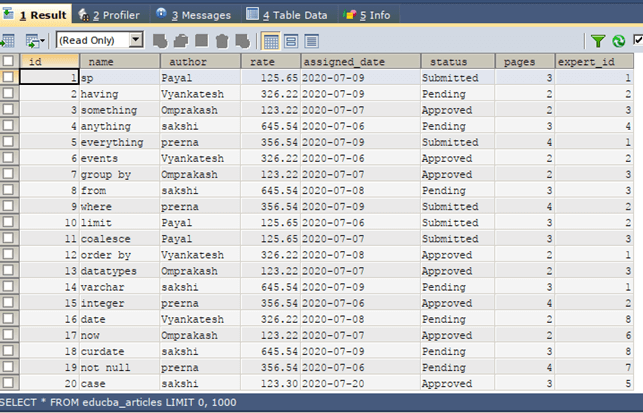Updated March 8, 2023
Introduction to SQL ignore-case
SQL Case sensitivity is to use the query statements and the keywords tables and columns by specifying them in capital or small letters of alphabets. SQL keywords are by default set to case insensitive, which means that the keywords are allowed to be used in lower or upper case. The names of the tables and columns specification are set to case insensitive on the SQL database server; however, it can be enabled and disabled by configuring the settings in SQL. The COLLATION is the property that decides and helps us to specify whether the elements other than keywords in SQL are to be allowed for case insensitivity or not. In this article, we will learn how we can check for the assigned collation values that determine case sensitivity of SQL and further see how lower and upper functions are used to make the queries that ignore the case of the values of the columns while searching or applying restriction. In this topic, we are going to learn about SQL ignore-case.
Checking the case sensitivity of SQL server
We can write the keywords SELECT, FROM, WHERE, GROUP BY, etc., in either upper or lower case as they are case insensitive in SQL. The objects other than the keywords, like names of columns, tables, views, triggers, stored procedures, etc., can either be case sensitive or case insensitive. By default, they are set to case insensitive. The COLLATION property of the SQL server can be checked by using the function named Sevrverproperty() of SQL and passing the COLLARION as the parameter to it to get the value that is set as the collation to that SQL server. After executing it, you will get the collation value as shown in the output of the following query statement most of the times –
SELECT Serverproperty('COLLATION') AS COLLATION;The output of the execution of the above query statement is as follows –
The collation value contains either CI or CS in it. They stand for case insensitive and case sensitive, respectively. In the above output, we can observe that the collation value contains CI that is case sensitive, and hence while querying on that database server, the objects other than keywords can be specified in upper or lower case. The same applies to keywords as they are allowed to be entered in any case, but most of the time, it is a good practice to use them in all upper cases according to conventions.
Alternatively, the collation property for SQL database server can also be checked by querying on the table named databases that are present in the sys database of your SQL server to check for the case sensitivity that is allowed for the particular database by mentioning the value of the name column as the value of your database name for which you are checking the collation. Let us a query for the existing database at my SQL server named educba and check for the collation value using the contents of the databases named table of sys database and following query statement –
SELECT collation_name AS COLLATION
FROM sys.databases
WHERE name = 'educba';The output of the execution of the above query statement is a follows, giving the collation value as SQL_Latin1_General_CP1_CI_AS in which CI stands for case insensitivity which allows us to query on that database by specifying non-keyword words in upper or lower case –
Using LOWER() and UPPER() functions for case in-sensitive that is ignoring the case in queries.
Suppose that the table named educba_articles that exists in my educba database has the collation set to case sensitive collation as shown in the below image –
Let us check the contents of the table by executing the following query statement on the table –
SELECT * FROM educba_articles;The output of the execution of the above query statement is as follows –
Now, executing the following query using lower function helps in retrieving all the submitted records –
SELECT * FROM educba_articles WHERE LOWER(status) = "submitted";The output of the execution of the above query statement is as follows –
Now, we will use the function to make an insensitive comparison that makes the comparison using the UPPER function as shown in the below query statement –
SELECT * FROM educba_articles WHERE UPPER(status) = "SUBMITTED";The output of the execution of the above query statement is as follows –
In a similar fashion, UPPER() and LOWER() functions can be used in the LIKE clause for getting similar records and making the search ignoring the case in the table or database having collation that shows CS that is case sensitive in its collation. Consider that we have to find out all the records of the table educba_articles table “ing” value in its name column. We can use the LIKE clause for searching the contents containing the “ing” value in the name, and further to search such that the case is ignored, we will use the LOWER() function first. Our query statement is as follows –
SELECT * FROM educba_articles WHERE LOWER(` name`) LIKE "%ing%";The output of the execution of the above query statement is as follows –
Now, let us use the upper() function to use the search facility that makes the ignore-case search. For this, our query statement will be as follows –
SELECT * FROM educba_articles WHERE UPPER(` name`) LIKE "%ING%";The output of the execution of the above query statement is as follows –
Conclusion – SQL ignore-case
The SQL case sensitivity can be set for non-keyword objects such as tables and columns by specifying the collation against the database, tables, and column level by mentioning CI or CS in it that stands for case insensitive and case sensitive, respectively. If the collation is set to CI containing the value that is Case insensitive, then there is no necessity to use any function like LOWER() or UPPER() to make the search to ignore the case. Further, we can make the search and condition specifying to ignore the case in SQL using the LOWER() and UPPER() functions while collation contains CS. This can be used while applying restrictions with equal to the operator or search with LIKE keyword to make search case insensitive, that is, the search or restriction that ignores the case.
Recommended Articles
We hope that this EDUCBA information on “SQL ignore-case” was beneficial to you. You can view EDUCBA’s recommended articles for more information.

